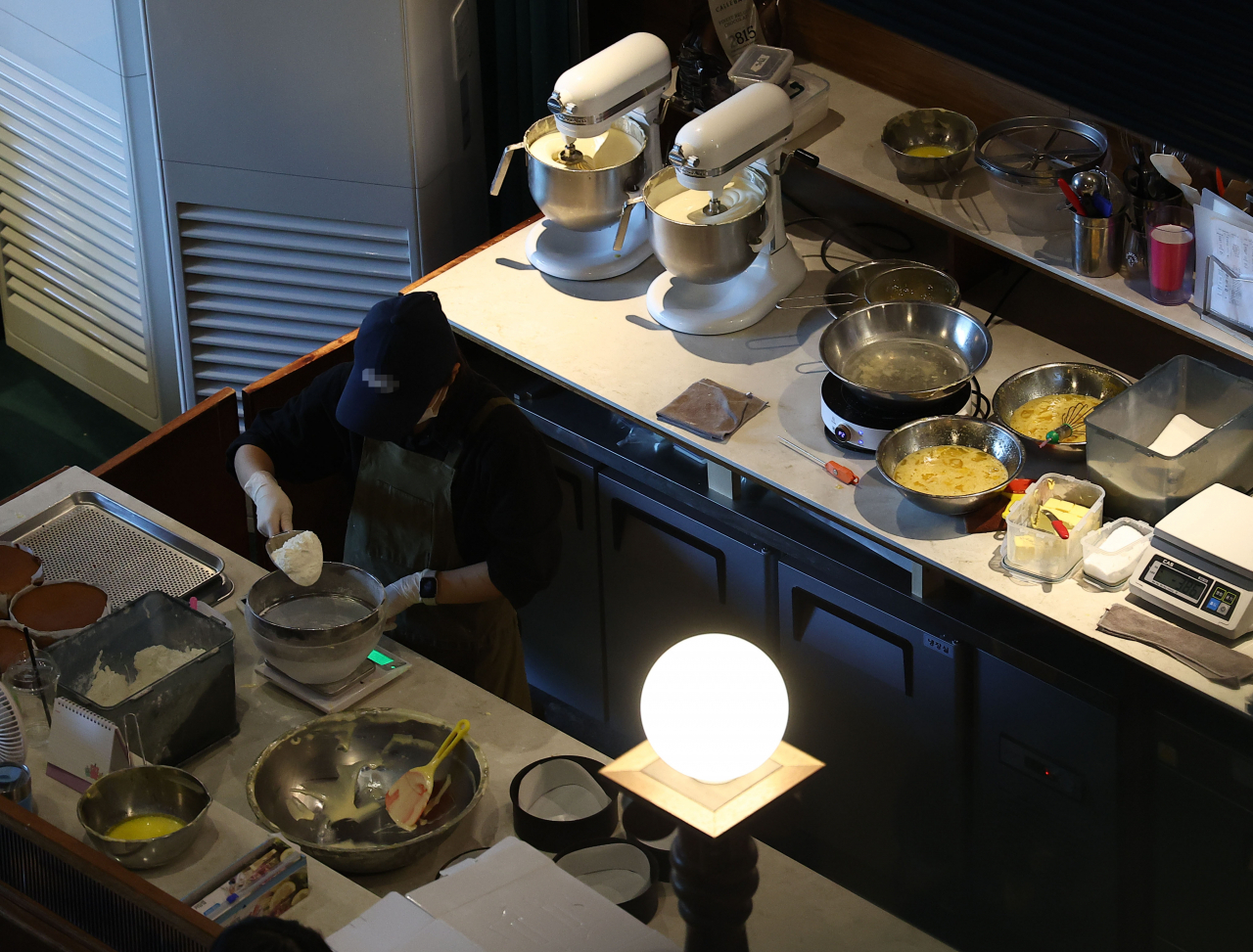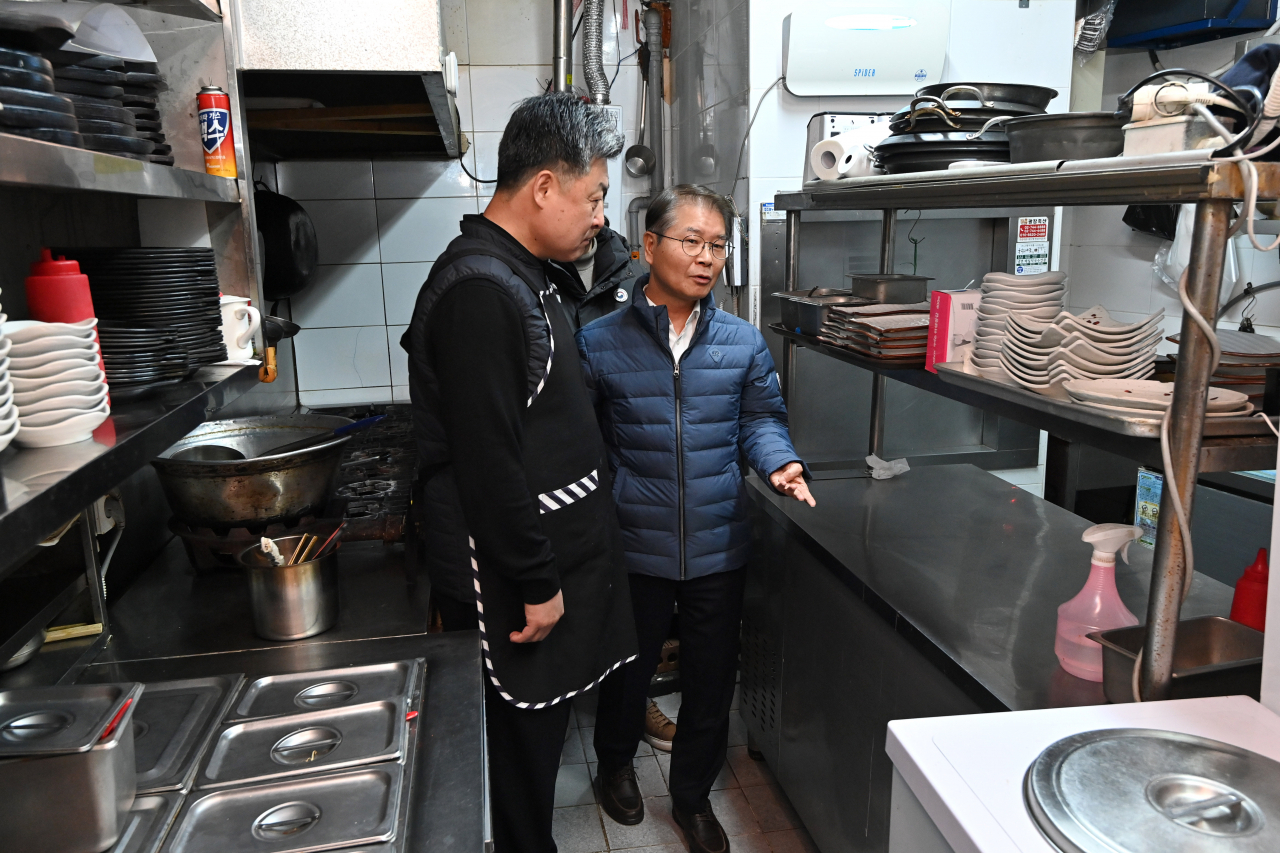 |
An employee makes dough at a bakery in Seoul on Friday, one day before expanded implementation of the Serious Accidents Punishment Act, a workplace safety law aimed at penalizing employers for serious industrial accidents, takes effect as scheduled. (Yonhap) |
Expanded application of the workplace safety law is expected to have a substantial impact on the South Korean business community, as it holds employers with more than five workers legally responsible for deadly accidents. Concerns are growing as this change, which officially took effect Saturday, will cover 837,000 workplaces, including small neighborhood restaurants, bakeries, pubs, cafes and mom-and-pop stores.
Regardless of the size of the businesses and their financial capabilities, under the law, employers of small and large companies face the same criminal charges if a deadly accident happens during their operations.
“I am paying more attention to safety as the workplace safety law is expanded. But I am very concerned that if an accident occurs, the business will be forced to close," said a business owner surnamed Kim, who has been running a timber company in North Chungcheong Province for 30 years. His company has 20 employees.
The food service industry argues that safety support should be provided before punishment is pursued.
“Many restaurant business owners are anxious because they think guidelines on the scope of responsibility are unclear. They are also worried since even with good safety training, accidents can always occur due to employee negligence. Some business owners are expected to reduce the number of employees they have hired for a long time to avoid the application of the law,” an official from the Korea Food Service Industry Association said.
The government also expressed regret over the rival parties' failure to delay the expansion of the law, saying that many small businesses are not ready to face the legal responsibility and that most are not even aware that they are now subject to the law.
President Yoon Suk Yeol and ruling People Power Party interim leader Han Dong-hoon on Monday agreed to make efforts to renegotiate with the main opposition Democratic Party of Korea on deferring the implementation of the law, saying it affects the livelihood of small business owners too much, according to them.
According to the Labor Ministry, every type of business with five or more employees, including restaurants, accommodations, hair salons, public baths and saunas, internet cafes and gas stations, is subject to the Workplace Safety Act.
The law covers regular full-time employees, contract workers and part-timers.
If a restaurant hires delivery workers directly, they are subject to the act. However, if they are “independent contractors” who also deliver for other restaurants, they are not counted as employees of specific businesses.
Business owners, however, would not face criminal charges for every accident. They only face criminal charges if a worker dies, two or more workers sustain serious injuries lasting more than six months or three or more workers suffer from acute poisoning or other illnesses within a year, due to inadequate safety measures. Even if an accident occurs, the employer would not be punished if he or she has fulfilled all obligations to ensure workplace safety and health.
Initially targeting large corporations from its inception in 2022, the Serious Accident Punishment Act expanded to apply to small businesses with 50 employees or less from Saturday.
The law, in the first phase, stipulated that business owners of companies with 50 or more employees would face criminal charges if a worker dies or sustains serious injuries due to inadequate safety measures. Employers could face at least one year in prison or fines of up to 1 billion won ($748,000) in the event of a fatal workplace accident. The government had earlier granted a grace period for companies with fewer than 50 employees, which account for about 80 percent of all serious accidents.
Now with the law being implemented, the Labor Ministry said that it would try its best to promote the details of the law.
“Small neighborhood restaurants and bakeries with more than five employees are now also subject to the expansion of the act. Therefore, it is important for business owners to identify risk factors in their workplaces and to have the capabilities of risk management,” Labor Minister Lee Jung-Sik said Monday morning during his visit to a restaurant in the popular shopping district of Myeong-dong in central Seoul.
 |
Labor Minister Lee Jeong-sik (right) inspects a kitchen at a restaurant in Seoul on Monday, two days after expanded implementation of the Serious Accidents Punishment Act, a workplace safety law aimed at penalizing employers for serious industrial accidents, went into force as scheduled. (Yonhap) |
The restaurant owner told the minister that he did not know exactly how to detect risk factors and what to improve, according to the ministry. Lee replied that the management of burning charcoal could be a risk factor. Accidents such as burns from hot oil or fire while frying foods in the kitchen or injuries from cutting sometimes happen in the restaurant business, according to the Labor Ministry.
“Rather than just being afraid, it is important for business owners to carefully observe and follow the guidelines established by the government,” Lee added. The Labor Ministry offers information through a website -- koshasafety.co.kr -- on safety standards and guidelines about the law.
"The government will carry out the Measures to Support Businesses Vulnerable to Fatal Accidents plan, which was announced on Dec. 27, as quickly and smoothly as possible," the Labor Ministry announced Friday. Under the plan, the government aims to provide a total of 1.5 trillion won to help strengthen safety management for small businesses.
The Labor Ministry also said that it would focus on supporting safety management at small businesses through the implementation of a self-assessment system for about three months, starting Monday.







